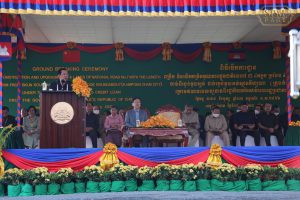An international watchdog group has added Cambodia to its watch list of countries that have seen a “rapid decline in civic freedoms,” citing the country’s sustained crackdown on unions, human rights defenders, and the political opposition.
The CIVICUS Monitor, an online platform that tracks the latest developments to civic freedoms across the world, said yesterday that the country had been added to the list, which also includes the likes of Iran, Peru, Sudan and Zimbabwe, “due to serious concerns about restrictions on fundamental freedoms, ahead of elections in mid-2023.”
“Repressive laws are routinely misused to restrict civic freedoms and criminalize human rights defenders, trade unionists, youth activists, journalists, opposition politicians and other critical voices,” the group said in a statement announcing the change.
The CIVICUS Monitor’s findings were only underlined by this week’s closure of Voice of Democracy (VOD), one of the country’s last remaining independent media outlets, on the orders of Prime Minister Hun Sen. The Cambodian leader claimed that a February 9 article about the country’s earthquake aid to Turkey had hurt the “dignity and reputation” of the Cambodian government, though it was much more likely to have involved the publication’s embarrassing reporting on the country’s industrial-scale cyber-scam operations and their links to government-affiliated tycoons.
The closure of VOD was just one of a long line of steps that have drastically curtailed the political space in Cambodia. The CIVICUS Monitor cited the government’s recent harassment and arrest of union leaders, referencing particularly a spate of violent crackdowns on striking workers from the NagaWorld casino hotel complex in Phnom Penh, and the rearrest in November of their leader Chhim Sithar.
It also listed the string of threats and criminal charges that have been brought against opposition leaders since the dissolution in 2017 of the country’s main opposition party, the Cambodia National Rescue Party (CNRP). Since then, several hundred CNRP supporters and activists have been arbitrarily arrested and detained on a variety of vaguely defined (and obviously politically motivated) criminal charges.
The war on the political opposition has also been paralleled by a separate from against the human rights defenders and civil society activists, against whom the same vague laws have been “systematically used” to harass and convict them. According to the CIVICUS Monitor, Hun Sen used the COVID-19 pandemic as a “pretext to further tighten his grip on power,” by enacting a severe state of emergency law that severely restricts fundamental freedoms.
Given that many of these problems date back years (aside from the COVID-19 law, at least), it is in some ways puzzling that it Cambodia is only now being added to the watch list. Indeed, the current status quo can be seen as an outgrowth of the 2013 national election, when Hun Sen’s Cambodian People’s Party (CPP) faced an unexpected challenge from a unified opposition represented by the CNRP.
After narrowly escaping defeat in 2013, the CPP government’s crackdown began in earnest in late 2015, when CNRP President Sam Rainsy was forced into exile, and culminated with the banning of the party in 2017, and an audacious frontal attack on the country’s independent press and civil society, which for many years the government had appeared to tolerate. Once the CPP had safely “won” the 2018 national election, sweeping all 125 seats in the National Assembly, it loosened its controls somewhat, but never relinquished the right to clamp down suddenly should a potential political challenge emerge.
In this sense, the belated listing offers some hints at just how successful Hun Sen and his administration have been at incrementally lowering the bar for what is considered an acceptable level of basic freedoms.

































